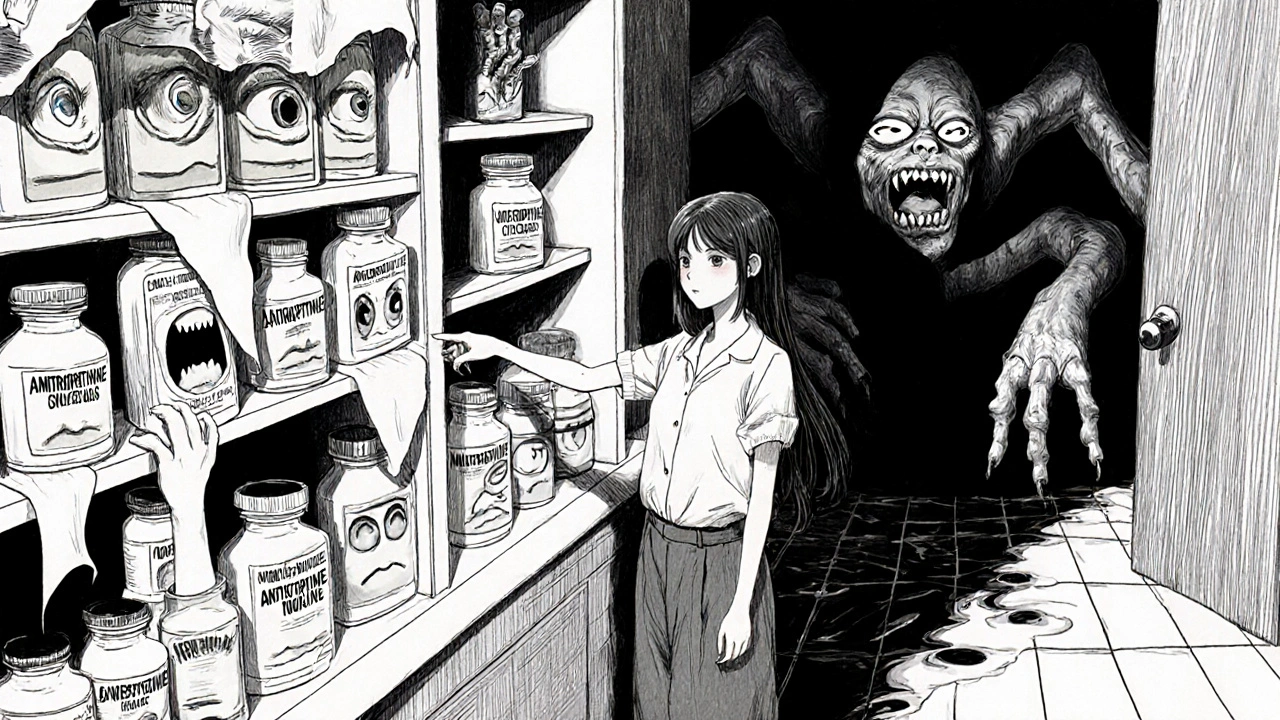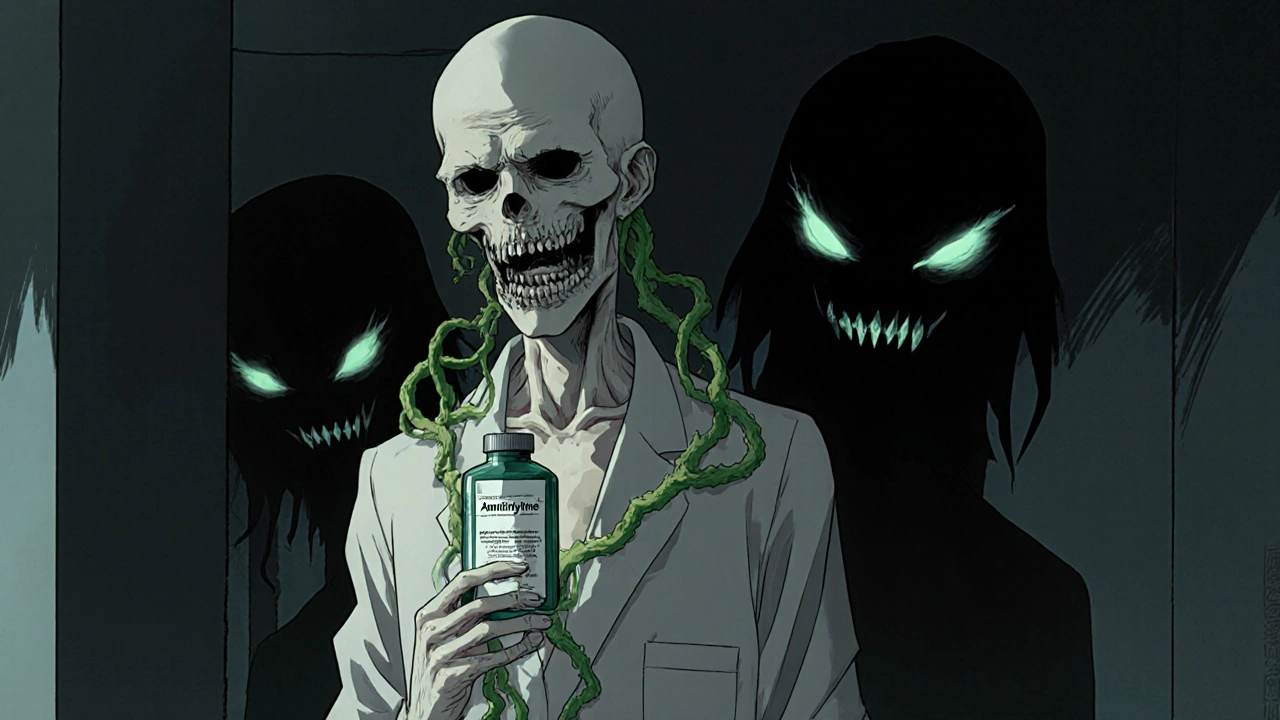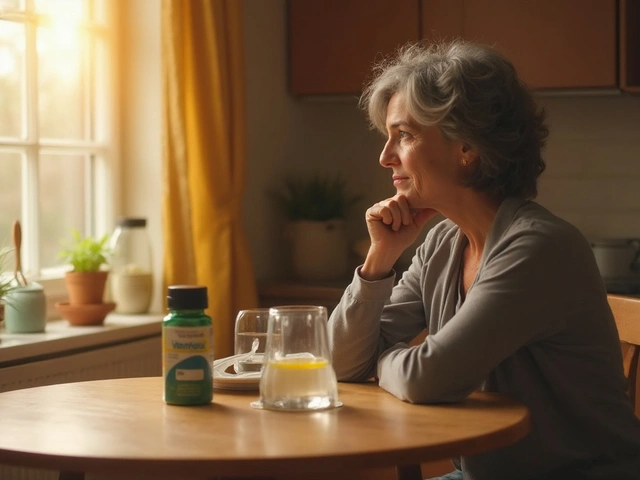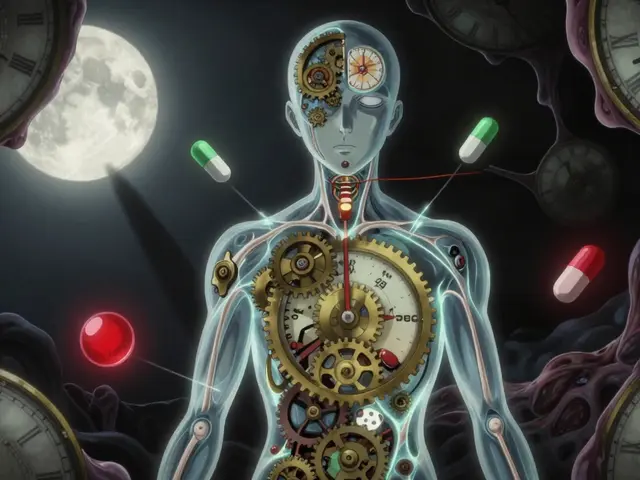Tricyclic antidepressants (TCAs) like amitriptyline and
How TCAs Work (And Why They Cause So Many Side Effects)
TCAs don’t just target one neurotransmitter. They block the reuptake of both serotonin and norepinephrine, which helps lift mood. But they also stick to other receptors in your body-cholinergic, histamine, and alpha-adrenergic receptors. That’s why they cause dry mouth, drowsiness, constipation, and low blood pressure. Amitriptyline is especially strong at binding to these receptors. Its affinity for muscarinic receptors is nearly 12 times higher than nortriptyline’s. That’s why amitriptyline makes you feel foggy and dry, while nortriptyline feels more tolerable for many people.
These aren’t random side effects. They’re direct results of the drug’s chemistry. When a medication hits multiple targets, you get multiple effects. That’s why TCAs can help with nerve pain and migraines-they’re not just antidepressants. They’re multi-tool drugs. But that versatility comes with a heavy burden.
Common Side Effects: Dry Mouth, Drowsiness, and More
Up to 30% of people taking amitriptyline report severe dry mouth. It’s not just uncomfortable-it leads to cavities, gum disease, and oral infections. One patient on Reddit said they went through three bottles of Biotene a week and still got two cavities. That’s not an exaggeration. Dry mouth reduces saliva, which normally protects your teeth. If you’re on a TCA, brush twice a day, chew sugar-free gum, and see your dentist every six months.
Drowsiness is another big one. Amitriptyline affects histamine receptors so strongly that up to 40% of users feel sleepy during the day. That’s why doctors start you on a low dose at bedtime. Nortriptyline is a bit better-around 25% of users report drowsiness. Still, if you’re driving or operating machinery, this can be dangerous. Don’t assume it’ll go away after a week. For some, it lasts the whole time they’re on the drug.
Constipation affects 20-25% of users. It’s not just a nuisance. Severe cases can lead to bowel obstruction, especially in older adults. If you haven’t had a bowel movement in three days, talk to your doctor. Don’t wait. Blurred vision happens in 15-20% of people. It usually clears up, but if it doesn’t, it can make driving risky. Urinary retention is another real problem, especially for men with enlarged prostates. Some patients end up needing a catheter.
Cardiovascular Risks: What Your Doctor Should Be Watching
TCAs can change your heart’s electrical rhythm. They prolong the QTc interval-the time your heart takes to recharge between beats. Amitriptyline can extend this by 20-40 milliseconds. That might sound small, but it can trigger a dangerous heart rhythm called torsades de pointes, which can lead to sudden death. That’s why your doctor should order an ECG before you start and again if your dose goes above 100 mg.
Orthostatic hypotension is common. When you stand up too fast, your blood pressure drops, and you feel dizzy or faint. This is especially risky for older adults. Studies show a 70% higher chance of falling if you’re on amitriptyline. Rise slowly. Sit on the edge of the bed for 30 seconds before standing. Wear compression socks if you’re prone to low blood pressure.
Heart rate can jump by 10-20 beats per minute. That’s not normal. If you feel your heart racing, check your pulse. If it’s over 100 at rest, call your doctor. TCAs also increase the risk of heart attacks and strokes compared to SSRIs. A 2019 Lancet study found a 35% higher risk. If you have a history of heart disease, TCAs are usually avoided.
Overdose: A Silent Killer
TCAs are one of the deadliest classes of antidepressants in overdose. Why? They have a narrow therapeutic window. The dose that helps you feel better is close to the dose that can kill you. An overdose causes QRS widening on an ECG (over 100 milliseconds), seizures, low blood pressure, and respiratory failure. Death usually comes from heart arrhythmias or cardiac arrest.
There’s no antidote. Treatment is supportive-IV fluids, sodium bicarbonate to counteract heart changes, and sometimes intubation. That’s why doctors are careful with dosing. Never take more than prescribed. Keep pills locked up. If someone takes too many, call 911 immediately. Don’t wait.

Cognitive and Behavioral Risks
Confusion and memory problems are common in older adults. Up to 25% of people over 65 on standard doses report confusion. Disorientation happens in 15%. The Beers Criteria, a trusted guide for safe prescribing in seniors, says to avoid amitriptyline entirely in this group. It increases the risk of dementia and cognitive decline by 50%.
Even younger people report “brain fog.” On WebMD, 28% of negative reviews mention mental sluggishness. It’s not just tiredness. It’s trouble finding words, forgetting appointments, feeling mentally slow. This can last for weeks or months. If it interferes with your work or relationships, talk to your doctor. It might not be worth it.
Weight Gain and Sexual Side Effects
Weight gain is a frequent complaint. Patients report gaining 10-15 pounds in the first six months. It’s not just appetite. TCAs slow metabolism and increase cravings for carbs. If you’re trying to manage your weight, this can be frustrating.
Sexual side effects are underreported but real. About 35-40% of men say they have trouble getting or keeping an erection. Women report reduced libido and difficulty reaching orgasm. These effects are similar to SSRIs but often worse with TCAs. If this is important to you, discuss alternatives before starting.
Why Doctors Still Prescribe Them
Despite all this, TCAs aren’t obsolete. For treatment-resistant depression, they’re more effective than SSRIs. A 2018 Lancet meta-analysis showed 65-70% response rates for TCAs versus 50-55% for SSRIs in people who failed other treatments.
For nerve pain, amitriptyline is still the gold standard. A 2020 Cochrane Review found it helped 35-40% of diabetic neuropathy patients reduce pain by half. That’s better than duloxetine or gabapentin. For chronic migraines, it reduces attack frequency by 70-80% in responders.
Secondary amines like nortriptyline and desipramine are preferred for older patients. They have fewer anticholinergic effects. If you’re over 60 or have heart issues, your doctor might start you on nortriptyline instead of amitriptyline.

How to Use TCAs Safely
- Start low: 10-25 mg at bedtime. Increase slowly over 4-6 weeks.
- Don’t stop suddenly. Withdrawal can cause electric shock sensations, nausea, and anxiety. Taper over 4-6 weeks.
- Get an ECG before starting and if your dose increases above 100 mg.
- Use a pill organizer. TCAs are easy to mix up.
- Stay hydrated. Drink water throughout the day to help with dry mouth and constipation.
- Use a fluoride toothpaste and floss daily. Dental damage is real.
- Monitor your blood pressure when standing. If you feel dizzy, sit down.
- Report confusion, memory loss, or falls to your doctor immediately.
Alternatives and Future Options
If TCAs are too risky, there are other options. SNRIs like venlafaxine or duloxetine work for depression and nerve pain with fewer side effects. Ketamine infusions are now used for treatment-resistant depression, though they’re expensive and not covered by all insurers. Newer drugs like vortioxetine and brexanolone are being studied for their cognitive benefits.
Genetic testing is emerging. If you’re a CYP2D6 poor metabolizer, your body processes amitriptyline slowly, leading to higher blood levels and more side effects. Testing can help your doctor choose the right drug and dose.
Some doctors now combine low-dose amitriptyline (10-25 mg) with an SSRI. This boosts effectiveness while reducing side effects. It’s not standard, but it’s being used successfully in clinics.
Final Thoughts
TCAs are powerful. They’ve helped people who had no other options. But they’re not safe for everyone. The side effects are real, frequent, and sometimes life-threatening. If you’re on one, don’t assume it’s normal to feel dry, dizzy, and foggy. Talk to your doctor. Ask if nortriptyline might be better. Ask about alternatives. Ask about monitoring. You deserve to feel better-not just less depressed, but truly well.
Are tricyclic antidepressants still used today?
Yes, but rarely as a first choice. TCAs like amitriptyline and nortriptyline are now used mainly for treatment-resistant depression, chronic nerve pain, and migraine prevention-especially when newer antidepressants like SSRIs haven’t worked. They account for only 5-7% of antidepressant prescriptions today, down from 30% in the 1990s.
Which TCA has the fewest side effects?
Nortriptyline and desipramine, both secondary amine TCAs, generally have fewer side effects than amitriptyline or imipramine. They’re less likely to cause dry mouth, constipation, drowsiness, and heart rhythm changes. For older adults or those with heart conditions, nortriptyline is often the preferred TCA.
Can you drink alcohol while taking amitriptyline?
No. Alcohol increases drowsiness, dizziness, and the risk of falls. It also worsens orthostatic hypotension and can increase the chance of heart rhythm problems. Even small amounts can be dangerous. Avoid alcohol completely while on TCAs.
How long does it take for amitriptyline to work for nerve pain?
For nerve pain, amitriptyline usually starts working in 1-2 weeks, but full effects may take 4-6 weeks. Unlike depression, which needs weeks to respond, pain relief can come faster. Still, don’t stop if you don’t feel better right away. Give it time, and track your symptoms.
Is it safe to take TCAs if I’m over 65?
Generally, no. The Beers Criteria strongly advises against using amitriptyline and other high-anticholinergic TCAs in people over 65. They increase the risk of confusion, memory loss, falls, and hip fractures. If a TCA is absolutely necessary, nortriptyline at the lowest possible dose may be considered-but only after careful review and monitoring.
What should I do if I miss a dose of nortriptyline?
If you miss a dose, take it as soon as you remember-but only if it’s still the same day. If it’s almost time for your next dose, skip the missed one. Never double up. Missing doses can trigger withdrawal symptoms like nausea, anxiety, or electric shock sensations. If you miss more than two doses in a row, contact your doctor.
Can TCAs cause weight gain?
Yes. Weight gain is common, especially with amitriptyline. Patients report gaining 10-15 pounds in the first 6 months. This is due to increased appetite, slowed metabolism, and changes in how the body stores fat. If weight gain becomes a concern, talk to your doctor about dietary changes or switching to a different medication.
Do TCAs interact with other medications?
Yes. TCAs can dangerously interact with MAO inhibitors, SSRIs, antihistamines, certain heart medications, and even some over-the-counter cold remedies. Combining them can cause serotonin syndrome, dangerously high blood pressure, or severe heart rhythm problems. Always tell your doctor and pharmacist about every medication and supplement you take.
Tricyclic antidepressants are not outdated-they’re underused. But they’re not for everyone. The key is knowing when they’re worth the risk. For some, they’re the only thing that works. For others, the side effects are too much. Talk to your doctor. Ask questions. Don’t settle for feeling worse just to feel less depressed.






9 Comments
james lucas
November 23, 2025 AT 08:27 AMman i remember when i first started amitriptyline for my back pain-thought it was gonna be a miracle drug but damn, the dry mouth was unreal. went through like 4 bottles of biotene a week and still ended up with two cavities. my dentist looked at me like i was smuggling candy into a monastery. also the drowsiness? holy hell. almost fell asleep driving to the grocery store. started taking it at night like they said but still felt like a zombie by noon. nortriptyline ended up being a game changer for me though-way less foggy, way less dry. if you’re on amitriptyline and struggling, ask your doc about switching. it’s not a big change but feels like a whole new life.
Jessica Correa
November 23, 2025 AT 19:38 PMi just want to say thank you for writing this. i’ve been on nortriptyline for 8 months now for migraines and i was scared to tell anyone how bad the constipation got. i thought it was just me being lazy but no it was the drug. started chewing gum drinking water and taking magnesium and it helped a ton. also the brain fog is real but i’ve learned to write everything down. my phone is full of reminders. not perfect but better than the pain. dont give up if it’s working for you just be smart about it
manish chaturvedi
November 23, 2025 AT 22:20 PMAs someone from India where access to mental health care is often limited, I have seen many patients prescribed TCAs not because they are ideal, but because SSRIs are too expensive or unavailable. While the side effects are well-documented and concerning, we must also acknowledge the reality that for many, this is the only viable option. I urge clinicians to prioritize patient education-especially around hydration, dental hygiene, and slow standing. In rural clinics, we use simple pictorial guides to explain these risks. A little awareness goes a long way. Also, nortriptyline is indeed a better choice for elderly patients, and I’m glad this was emphasized.
Nikhil Chaurasia
November 24, 2025 AT 18:16 PMi just read this and i’m sitting here wondering how anyone survives this. i mean seriously-dry mouth, constipation, heart rhythms, brain fog, weight gain, sexual dysfunction… and you’re supposed to just ‘tough it out’ because it ‘works’? this isn’t medicine this is a gamble with your body. i had a friend take amitriptyline for depression and she ended up in the hospital with a urinary retention and a 3-day hospital stay. they said ‘it happens’ like it’s normal. it’s not normal. it’s dangerous. if your doctor pushes this on you without a full cardiac workup and a conversation about alternatives, find a new doctor. period.
Holly Schumacher
November 26, 2025 AT 02:11 AMLet’s be clear: TCAs are not ‘underused.’ They’re underused because they’re dangerous, outdated, and poorly understood by many prescribers. The fact that someone wrote a 2000-word post detailing every possible side effect and still got 200 upvotes proves how little critical thinking exists in mental health discourse. The Lancet study showing a 35% higher risk of heart attack? Ignored. The Beers Criteria warning against use in seniors? Overridden. The absence of an antidote in overdose? Dismissed as ‘rare.’ This isn’t informed consent. This is medical negligence dressed up as ‘hope.’ If you’re on a TCA, you are not ‘managing’ your condition-you’re surviving a pharmacological hazard. Please, for the love of everything sane, ask for alternatives. There are better options. Always.
Shawn Daughhetee
November 27, 2025 AT 21:48 PMmy mom was on amitriptyline for years for her nerve pain and she never told me how bad the dizziness was until she fell and broke her hip. i didn’t even know she was on it till then. she’s 72. they should just not give this to anyone over 60. period. i got her switched to gabapentin and she’s way better. no more fog no more falls. i wish someone had told us this before it was too late. please listen to this post. don’t wait for a fall to realize something’s wrong
Miruna Alexandru
November 29, 2025 AT 19:29 PMThe tragic irony here is that TCAs are simultaneously overprescribed and misunderstood. We glorify their efficacy in treatment-resistant cases while ignoring the silent erosion of cognitive function, metabolic health, and autonomy they induce. The ‘multi-tool’ framing is dangerously romantic. A drug that binds to five receptor systems isn’t versatile-it’s indiscriminate. The fact that we still tolerate QTc prolongation as ‘manageable’ speaks to our collective desensitization to iatrogenic harm. This isn’t pharmacology. It’s risk roulette with a side of dental decay. And yet, we call it ‘care.’
Justin Daniel
December 1, 2025 AT 02:33 AMso i’ve been on nortriptyline for 6 months for migraines and honestly? it’s the only thing that’s ever worked. yeah i get dry mouth and i’m always thirsty but i carry a water bottle like it’s my job. and i sleep like a rock-which is great since i used to lie awake for hours. the weight gain? yeah i put on 12 lbs. but i’d rather gain weight than have a migraine that lasts 3 days. also i stopped drinking coffee and it helped a ton. my doc says i’m lucky i’m not on amitriptyline. i believe her. this isn’t perfect but it’s the least terrible option i’ve found. if it works for you, don’t let the scary parts scare you off completely. just be smart about it.
Melvina Zelee
December 2, 2025 AT 21:05 PMi think the real question isn’t whether tcas work but whether we’ve stopped listening to our bodies. we’re taught to push through dry mouth, dizziness, brain fog like they’re just part of the process-but what if they’re your body screaming for help? i was on amitriptyline for 4 months and i forgot my own birthday. not kidding. my sister had to remind me. i didn’t even notice till she said something. that’s not normal. that’s not ‘side effect’ that’s your mind being chemically muted. i switched to venlafaxine and it took 3 weeks but now i remember names again. i remember what i ate for lunch. i remember i like music. the tradeoff wasn’t worth it. if you’re on a tca and you feel like you’re living behind glass… you’re not imagining it. get help. ask for another option. you deserve to feel alive-not just less sad.